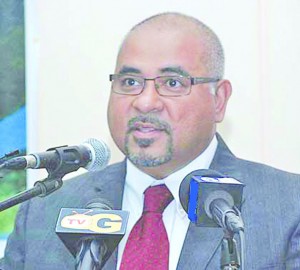– arbitration filed in London

CGX Energy Inc has announced that its wholly-owned subsidiary, CGX Resources Inc, has obtained an injunction order from Guyana’s Commercial Court restraining Repsol Exploracion from proceeding with the 30 percent farm-out of the Kanuku Petroleum Prospecting Licence to RWE Dea AG, pending the determination of arbitration proceedings filed late last year.
On December 23, CGX Energy announced the commencement of arbitration proceedings under the rules of the London Court of International Arbitration against Repsol in connection with the expiry of the Petroleum Prospecting Licence (PPL) covering the Georgetown Block.
CGX Energy Chief Executive Officer Dewi Jones said the company was pleased with the decision of the commercial court and will continue to work towards protecting the interests of its shareholders by pursuing this claim against Repsol.
Consortium
CGX and Repsol were part of a consortium that owned the Georgetown Block PPL, which was operated by the latter company.
CGX publicly announced on December 23 that it was proceeding with arbitration against Repsol with respect to the Kanuku licence offshore Guyana.
CGX Energy Co-chairman, Dr Suresh Narine noted that when the Georgetown Block partners decided to cease drilling and plug the Jaguar 1 well, due to safety considerations, CGX Energy immediately indicated its intention to continue exploring the Georgetown Block.
“This is because we strongly believe in its prospectivity, as we indeed strongly believe in the prospectivity of the Guyana-Suriname basin,” he said. “This latest step with the courts in Guyana seeks to further protect our shareholders’ rights with regards to the results uncovered by the Jaguar 1 well.”
CGX expressed its interest in continuing in the licence with or without Repsol in accordance with the terms of the Joint Operating Agreement (JOA). Repsol, in turn, unilaterally decided not to pursue renewal of the licence and then seek a new licence on its own.
Dr Narine had said then that Repsol allowed the jointly held Georgetown licence to lapse contrary to its obligations as operator of the block, and then in bad faith immediately applied for sole ownership of the Kanuku licence covering essentially the same area as the Georgetown licence, thereby excluding CGX’s shareholders from their rightful stake in the licence.
Important decision
On December 30, 2013, Repsol announced that it had reached agreement to farm out 30 percent of the Kanuku licence to RWE Dea, despite CGX’s legal challenge. However, regulatory approval from the Guyana Geology and Mines Commission (GGMC) had not yet been procured.
In view of Repsol’s announcement of an intended farm-out, CGX sought injunctive relief in Guyana to prevent Repsol from farming out the licence until the court of arbitration had ruled on the matter.
On Friday, Justice Rishi Persaud, sitting in the Commercial Court in Guyana, granted an injunction order upon CGX’s ex parte application, restraining Repsol from proceeding with its announced farm-out pending the hearing and determination of the arbitration proceedings.
“This is an important decision as it not only ensures that no moves can be made by Repsol before the matter is resolved and therefore, prevents the situation from becoming complicated, but also it sends a strong message internationally that the legal landscape in Guyana is one which is in accordance with international law and that all companies can rely on a robust legal system to protect their operations and investment,” said Dr Narine.
Resolution
Dr Narine said CGX is highly motivated to speedily resolve the issue so that it and its partners can expeditiously continue to pursue activities designed to realise the goals of its shareholders and the government and people of Guyana, namely, to find commercial quantities of petroleum in the basin.
“It is, therefore, open to Repsol to negotiate a satisfactory and speedy conclusion to this issue,” added Dr Narine.



